- Home
- Sherwood Smith
The Fox Page 2
The Fox Read online
Page 2
Dasta had understood Inda’s single word. If Inda went, there had to be a reason, and even if there weren’t, it was better to be with friends. Nothing else in the world made sense anymore. Maybe with friends, life with pirates would be bearable. “I’m in,” he said.
“So let’s get ready for the fun,” the captain said, gesturing toward those who had refused, and every one of the new pirates braced against the anguish of conscience.
But then respite appeared, a sight so unexpected, so astonishing, the newcomers stared. It was a small, round, fair-haired woman wearing what looked like a formal court gown—loops and loops of lace, ribbons, on fabulous brocade—something you never expected to see on a pirate ship. None of them knew the gown was three years out of Colendi fashion, and even in fashion would never have been worn by its dead owner outside, during the day. The jewels around the low-cut neck glittered with painful brightness.
“Coco has a new toy,” she said, laughing as she swept aft through hastily deferring pirates. “Pretty-boy says Coco can have him if there’s no torture of his mates.” She pouted, then crooned, “Coco wants her pretty boy.”
And there was Tau, following in her wake, clean and dressed in a new shirt and trousers, a bandage around his forehead like a headband, over which his freshly washed golden hair fell loosely, a gleaming hip-length cape fluttering gently in the breeze. The expression on his extraordinarily handsome face was tight with self-mockery.
The captain slapped his knee. “What? Traders carry their own bawdy-boys? Never knew them for merry wights. Well, then, a promise is a promise, my sweet.”
A casual flick of his fingers, and three pirates turned on the three who had refused and slit their throats.
Pirates got rid of the bodies, fetched buckets, and sloshed the deck free of blood. And so, without any words of memorial, Inda’s mates were gone.
“Clean these up and feed them,” Captain Walic said with a weary wave of his hand at his new crew. “Put them in watches. Any extra can go over to the Sea-King. They need a top-hand or two. Come, Coco, let’s see what your new toy can do for us.” He got to his feet and strode down the deck, his crew and the newcomers all motionless around him.
Walic, the startling female, and Tau vanished into the cabin and shut the door.
The pirates turned wearily to repairing damage and restowing the taken cargo.
Inda was still gripped by Fox Montredavan-An, who stared at the captain’s door, his mouth tight with distaste.
“Tau was trained in his mother’s pleasure house, but he’s been with us for years,” Inda croaked.
Fox’s eyes were a rare shade of green—not the usual hazel mixture of gray and brown and bits of spring green, but an aggressive summer green, glinting with pinpoints of light reflected off the sun-splashed water running alongside the ship. “He’s a bawdy-house boy, like Coco was a bawdy-house girl,” Fox retorted softly, in Iascan. “He moves like one, he sounds like one, that means he thinks like one. They sell themselves; they’ll sell anything.”
Inda was too exhausted, hungry, and pain-hazed to argue. Tau was alive, Tcholan, Thog, Dasta, and the two scrubs—Mutt and Uslar—were alive.
Right now that was all that mattered.
Fox’s sarcastic expression changed to a narrow-eyed assessment. “Come along. Can’t have you dying on your feet.”
Inda obeyed, glad to be following someone from home, someone he could trust. His wounds and bruises hurt too much for him to want to talk. Peripherally he noticed things. Outside of the damage that he and his band had done, the ship was clean. Many of the pirates moving about were stiff; others had bandage-wrapped arms, legs, and heads.
Inda was pushed down onto a pile of winter sail that had been brought up to the weather deck so the hold could be restowed. He tried to listen while the pirate with the tinkling chimes braided in his hair barked words at him. But the slamming pain radiating from the lump behind his ear where Fox had struck him had increased to deafening effect.
Larboard watch . . . mizzenmast sails and cut-boom crew . . . rope repair when not tending sail or working the boom . . . front of the fighting when they fought . . . “You listenin’, stupid?”
Inda made an effort to concentrate. “Yes.”
It took him so long to get that word out, the second mate decided he really was stupid. All the better. He wanted no trouble on his watch. “You newcomers are expendable. If you’re good, you live.”
His loud laugh rang through Inda’s skull.
“If you mind orders, you might even work up to a cut of the loot. Cap’n pays well when you’re loyal and don’t cross him.” Another even louder laugh. “Cross him, and you’re entertainment.”
Inda closed his eyes when, at last, the harsh voice went away. A cup of soup was pushed into his hands. He drank it, then let the cup fall to his lap. Nothing mattered except one breath, in, out. Another, in, out. For a precious instant the world was content to move around him, leaving him a mote caught in meaningless motion.
It did not last.
“Come on.”
He was pulled to his feet. The headache crashed, but not as resoundingly; a soft blanket dropped between him and the worst of the pain. Without surprise or curiosity he recognized the herbal tranquility of expensive green kinthus: a heavy dose.
“We’ll begin with repair aloft.” Fox lifted a hand toward the mizzenmast as the Cassad closed in behind them.
Inda fumbled at the shrouds. Brisk hands pulled and tugged him until the three of them sat on the masthead, the enormous gaff sail snapping in a long curve below as they began to pull arrows out of the mast.
The kinthus had muted most of the pain by now, but Inda had trouble grasping with his fingers. Not that it mattered. Nothing mattered—an effect of green kinthus, which smothered emotion as well as pain. “I didn’t know pirates used kinthus,” he observed, as the rat-faced Cassad dropped to his knees beside him, working at an arrow just below the masthead.
Fox uttered a short laugh at the mild inquiry in Inda’s face, his heavy-lidded brown eyes. “They don’t. You repair yourself, or your mate, or die. It’s mine. My mother having taught me something of herbs, and a few healer spells.” He spoke in Marlovan again, soothing to Inda’s spirit.
“Marlovan,” Inda murmured. To Fox’s silent companion, “You’re a Cassad.”
A snort. “Montrei-Vayir. My mother was a Cassad.”
Inda squinted, trying to bring into clearer focus that broad, high forehead, cheeks tapering over bones even more sharply cut than Fox’s. Thin sun-bleached hair pulled back into a sailor’s tail. “You’re Barend,” Inda said. “Aren’t you? Sponge’s cousin? He talked a lot about you.”
“Sponge?” Fox repeated, brows aslant.
Inda was surprised. “King’s second son—”
“I thought his name was Evred.”
“We call him Sponge,” Barend said, and Inda was again surprised; if he’d found another Marlovan, he knew he would have talked about home all the time. But apparently these two did not. Oh, right. It was Barend’s royal ancestors who exiled Fox’s royal ancestors. Were they friends? No matter now . . . what mattered was, “When did you see Sponge last? Was he well? Still in the academy, of course—”
“I haven’t been home for, oh, three years,” Barend said, chuckling under his breath. “Seems like thirty. Been even longer for Fox,” Barend added, jerking a thumb toward the redhead before he reached up for another arrow.
“Yes, and you’re going to tell us what happened at home,” Fox said, leaning forward. “As soon as we lifted the information about a reward for ‘Lord Indevan from Iasca Leror, son of the Prince of Choraed Elgaer’ we saw to it Gaffer Shitbrain got the bright idea of taking you to sell to the Venn.” He yanked free five arrows, one after the other, with surprising strength.
“Then we had to find you,” Barend said. “That was some chase.” He dumped his arrows onto Inda’s lap.
“But we did,” Fox said, tossing another arrow down. “And
here you are. So now you talk. We still don’t know what happened at home to set the Venn on the homeland.”
“I don’t know either.” Inda tentatively felt the scabbed lump behind his ear, then let his hand drop. “Just that there’s war in the north. Found out when the Venn stopped our old trader in the strait. Yapped out threats against Marlovans. We lost the trader not long after, so we started the marines.”
“That’s how we tracked you,” Barend said. “You were getting quite a rep.”
Inda shook his head slowly. “Tracked you.” How many of the marines he’d trained, ate with, slept beside, fought beside, were now dead?
He pressed the heels of his hands against his eyes, as if to press away the memories, but it hurt his face, so he dropped his hands. “I haven’t been home since I got sent away. When I was eleven, almost twelve.”
Fox’s face changed from interest to mockery as he leaned back against the mast for a moment, his long fingers absently tapping out one of the old drum tattoos against the wood. His profile was expressionless, only the narrowing of his eyes betraying his disappointment—and self-mockery.
Barend sighed, knowing that Fox was angry with himself for hoping there would be news about home. For caring.
Barend did care, and he wasn’t angry at dashed hopes, just resigned. On his last visit home he’d heard about Inda’s dishonor and disappearance, not from his cousin Evred, but from his own mother. Now he realized that the “dishonor” had been thorough, to be expected if his father had anything to do with it—though Barend could not imagine why it had happened. Evred had not made Inda sound like the sort of boy to earn dishonor but more like a hero from the old ballads.
Barend opened his hand toward Fox. “Anyway it was his idea. Pick a likely yellowhead and make sure he died, say that was the Marlovan ‘lord’ and rescue you. You made it easy, leading us to you with the Marlovan fox yip. Then we saw not one but two tow-heads near you, both of ’em good fighters.” He stood up to yank out a couple more arrows.
Fox studied Inda in his filthy shirt and deck trousers, his face bruised, his sun-bleached brown hair tangled with dried blood and sweat. Inda was short, broadening through the shoulders and arms, still knobby in the awkward way of adolescents. Fox calculated rapidly as he worked two arrows free of the spanker gaff. Inda couldn’t be more than sixteen.
Whistling tunelessly, he thought back to that battle to take the traders. Good fighter, and—though he’d continue to lie through his teeth, the first mate was right—Inda had also been in command. At sixteen?
Inda was also thinking about the fight, but from the other side. Underneath the soft cloud of kinthus lay the pain of sorrow—he knew that, like wounds sustained during a fight, it only hurt a little now, but later it would be terrible. “My mates,” he said hoarsely. “You killed Kodl and Dun.”
Fox and Barend heard the emphasis on “you.” Barend looked at the arrow in his hand—probably made by one of those mates. “Didn’t know they were your mates,” he muttered.
Fox jerked his chin over his shoulder. “If it wasn’t us, it would have been someone else. Maybe Brotherhood. How many of you would have survived that? Or,” he leaned closer, eyes narrowed, “if offered the chance to join Gaffer Walic’s merry crew, would they have? Would you, if I hadn’t warned you?” He threw his two arrows down onto Inda’s lap.
Emotion seeped up through the kinthus. “I don’t know,” Inda said, staring down at the arrows—the top one made by Dun. He recognized the beautiful smoothing. From the anguish his mind wailed why?
Before he could voice it, Fox spoke again. “You probably would have done what we did,” Fox said. “Survived. And then, if you heard about someone from home, you would do anything to—” He stopped, unwilling to reveal himself by saying the words hear about home.
But Inda, extraordinarily sensitive despite the influence of kinthus, heard it anyway.
To Barend, things were simple: three Marlovans against the rest of the world.
Fox sensed Inda’s ambivalence. Time for a deflection. “How did you manage to get a Delf to join your band, anyway? Far as I can see, the Delfin Islanders are as notorious for avoiding outsiders as they are for their clan feuds.”
Barend chuckled. “I keep hearing the only time you can get Delfs to agree on one thing is when outsiders try to interfere with ’em. Then they all band together long enough to scrag you.”
“Ours was on my first trader,” Inda said, thinking sadly of tough, scrawny, bird-nosed Niz. “He went right along with the marine defenders idea when we lost the ship. Since we couldn’t get hired in any kingdom port.”
Fox flicked a glance Barend’s way. “So your father must have gotten his wish—and his war.”
Barend snorted, not quite a laugh. “If Iasca Leror really did conquer Idayago, then my father finally became Harskialdna instead of a mere Sierandael.”
Sierandael: the Marlovan title for the peacetime Royal Shield Arm, as Harskialdna was the coveted title for wartime Shield Arm.
“Harskialdna,” Barend repeated. “What he wanted. He always gets what he wants. Except for me.” He grinned.
Inda drew in a slow breath. “Why is the captain called Gaffer?”
Fox sent a look of hatred down toward the deck. “Because he took a ship when he was a mid. Mutiny. You don’t want to know what he did to the captain, but it involved a gaff. That’s why he only wants stupid hands who can fight. He lives in fear of another mutiny. If you’re seen talking to anyone by his favorites and they suspect conspiracy—and they are always looking for conspiracy—you’ll get the rope’s end, if not a torture party all for you. So guard your tongue waking and sleeping.” Fox’s teeth showed briefly. His fingers drummed faster. “Let’s finish. We’ve got all the arrows—you can sleep while we plug up the holes. Questions? ”
“How did you survive?” Inda asked. “You’re not stupid.”
Fox grimaced. “The pirates who attacked our warship wanted crew. I was younger than you, but I could fight. I went along to stay alive, then jumped ship when I saw a chance—” He hesitated, then jerked his chin again, a dismissive gesture. “It’s a long, boring story, but I ended up on a privateer attacked by Gaffer Walic. I was in even worse shape than you, but I’d killed some dozen of them first. The first mate hammered me from behind with a sword hilt. For a couple of days I couldn’t see out of one eye or hear from one ear. It took me a long time to comprehend even simple words. Walic assumed I was stupid but handy in battle, so I lived. We were part of the fleet that burned Barend’s trader convoy half a year later.”
“Fox recognized my handsome Cassad features,” Barend said with a twisted grin.
Fox snorted. “Once you’ve even seen a drawing of a Cassad—or someone descended from a Cassad” —he jerked a thumb at Barend— “you can always recognize them. I lied my way onto the sorting crew under the second mate. Told Barend to be stupid.”
So they wanted to hear about home. They want to band together with other Marlovans.
“How does one be stupid?” Inda’s voice was fading.
“By never speaking. By being slow with words when you do have to speak. By serving as the butt of jokes, and pretending you don’t realize it. By obeying Walic and the first and second mates, who are his Shield Arms, to use our own terms. And doing it without reaction.” The last, uttered in soft tones of such repressed rage, of loathing, tightened the back of Inda’s neck.
Fox rose abruptly, picking up the arrows from Inda’s lap. Inda returned to what mattered to him most. These were Marlovans. One was Sponge’s cousin; the other had been kind to him once. “You said. When you woke me. About taking the ship.”
Fox’s brows slanted sharply. “That’s the thought that has kept me alive these past couple of years. With you, and your followers, and the best of the forced hands, maybe we can do it. There are enough forced hands who hate the Gaffer as much as we do. It’s finding the time and place to get together and plan that’s the trick.”
Ind
a experienced a tectonic shift in his thoughts as pieces of his fractured worldview settled again into a semblance of a whole. These fellow Marlovans had joined to survive, not to become pirates. They wanted to band together . . . and they wanted— “To go back home,” he said out loud, savoring the words. The prospect of happiness, of meaning. “And fight the Venn.” He got slowly to his feet.
Fox’s soft gust of laughter was a lightning strike to Inda’s new, fragile sense of purpose, found after five long years hunting for a semblance of one.
“Fight the Venn!” Fox mocked, his sea-green eyes wide with derision. “Fight the Venn? We’re supposed to act stupid, not be stupid. I want this ship for myself.” He poked his bundle of arrows into Inda’s chest. “And you’re going to help me take it.”
Chapter Two
THE scout craft Vixen sailed through the night, running from pirates.
Fire scorches and bristling arrows in the hull and up the single mast evidenced the ferocity of the fight from which they’d fled.
Jeje sa Jeje, steady at the tiller all night, tried at dawn to sleep. As she lay in her hammock all she saw was the uneven battle, lit at first by fire arrows and torches, then by burning ships. Her orders from Inda were to run to Khanerenth and bring back aid to the marine defenders.
Exhausted as she was, she returned to the deck. The light of day showed that they had sailed into a fog bank, which was good for hiding but not for wind or navigation. But Jeje kept the scout under full sail, watching the slackened mainsail with jaw-locked tension as the worn winter canvas— their summer sail had been ruined by arrow holes—rippled and sagged, belled then sagged again.
Rays of glaring sunlight stabbed through the fog during late afternoon.
The younger of the two Fisher brothers who made up part of her crew had given up trying to pry arrows out of the rail and mast. He had turned his attention to the sun shafts lancing below the surface of the greenish water, illuminating faces, arms, then fins. He looked into Jeje’s strained face, and made a praiseworthy—though misguided—attempt to distract her by saying, “Got something to drop over the side?”

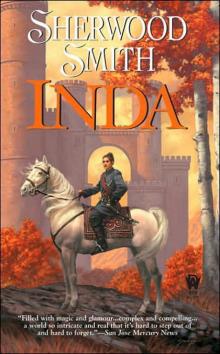 Inda
Inda Danse De La Folie
Danse De La Folie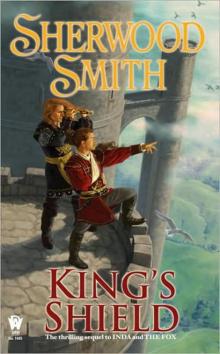 King's Shield
King's Shield Whispered Magics
Whispered Magics Fleeing Peace
Fleeing Peace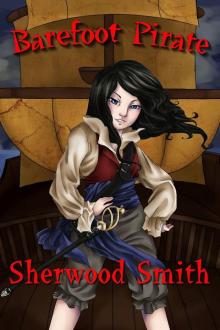 Barefoot Pirate
Barefoot Pirate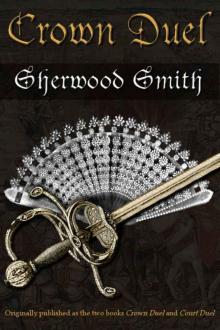 Crown Duel
Crown Duel Mearsies Heili Bounces Back
Mearsies Heili Bounces Back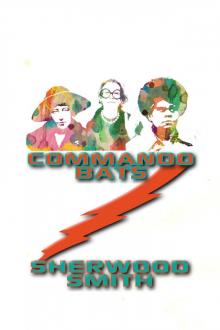 Commando Bats
Commando Bats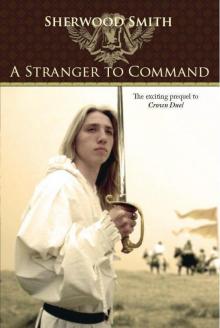 A Stranger to Command
A Stranger to Command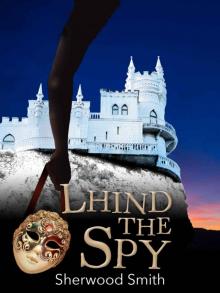 Lhind the Spy
Lhind the Spy The Spy Princess
The Spy Princess Blood Spirits
Blood Spirits Sasharia en Garde
Sasharia en Garde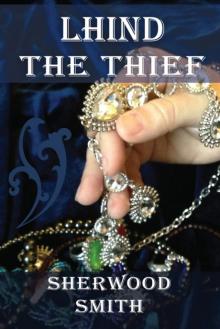 Lhind the Thief
Lhind the Thief Paradise Drift
Paradise Drift Banner of the Damned
Banner of the Damned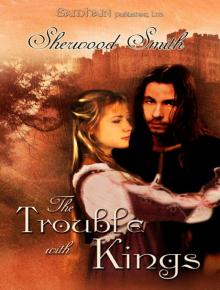 The Trouble With Kings
The Trouble With Kings Poor World
Poor World Treason's Shore
Treason's Shore Wren Journeymage
Wren Journeymage A Posse of Princesses
A Posse of Princesses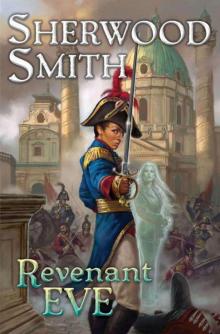 Revenant Eve
Revenant Eve Once a Princess
Once a Princess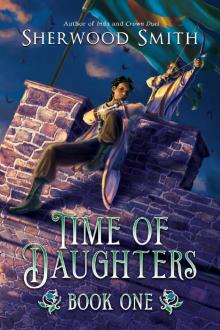 Time of Daughters I
Time of Daughters I Rondo Allegro
Rondo Allegro Coronets and Steel
Coronets and Steel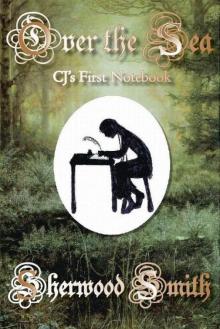 Over the Sea
Over the Sea Senrid
Senrid Hunt Across Worlds
Hunt Across Worlds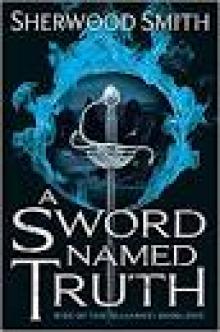 A Sword Named Truth
A Sword Named Truth The Fox
The Fox Twice a Prince
Twice a Prince Fair Winds and Homeward Sail: Sophy Croft's Story
Fair Winds and Homeward Sail: Sophy Croft's Story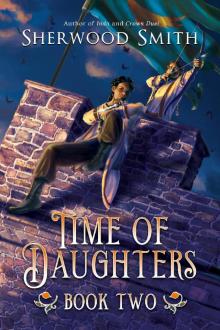 Time of Daughters II
Time of Daughters II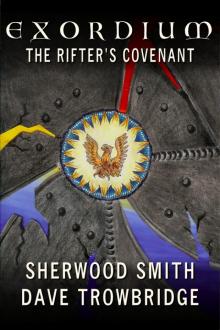 The Rifter's Covenant
The Rifter's Covenant The Phoenix in Flight
The Phoenix in Flight Stranger
Stranger The Thrones of Kronos
The Thrones of Kronos A Prison Unsought
A Prison Unsought Twice a Prince: Sasharia En Garde Book 2
Twice a Prince: Sasharia En Garde Book 2